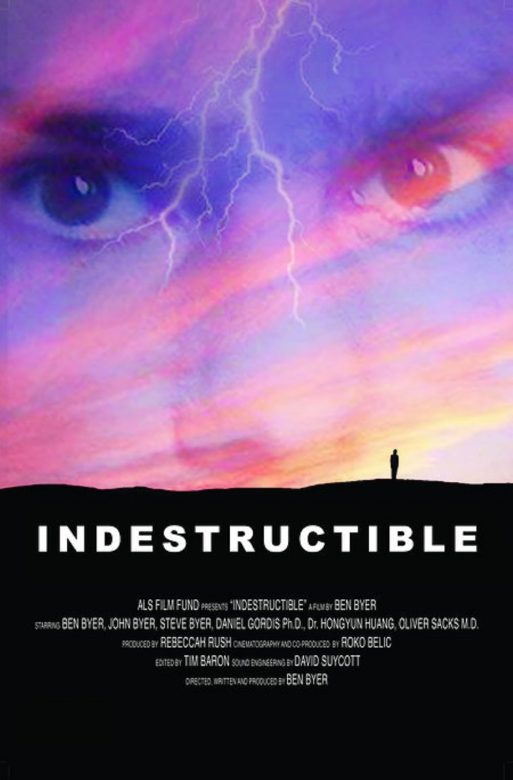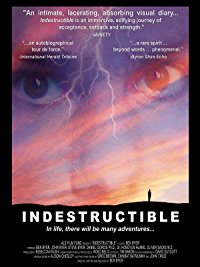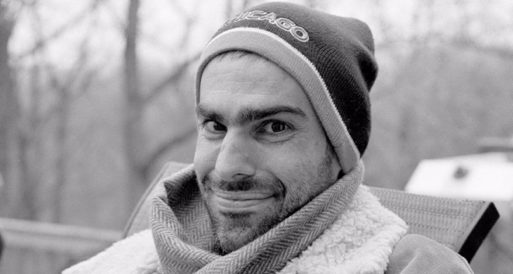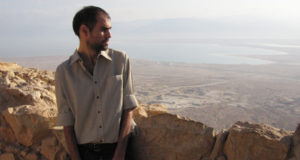 Ben Byer died of complications from amyotrophic lateral sclerosis (ALS) on July 3, 2008. He was 37 years old. Ben was diagnosed with the disease nearly six years prior in 2002 at the age of 31. He was an actor and filmmaker, and decided to chronicle his fight against the illness. What started as a personal video diary blossomed into “Indestructible,” a documentary film about the disease and his worldwide search for a cure.
Ben Byer died of complications from amyotrophic lateral sclerosis (ALS) on July 3, 2008. He was 37 years old. Ben was diagnosed with the disease nearly six years prior in 2002 at the age of 31. He was an actor and filmmaker, and decided to chronicle his fight against the illness. What started as a personal video diary blossomed into “Indestructible,” a documentary film about the disease and his worldwide search for a cure.

“Indestructible” is an extremely personal film. It was directed and partially filmed by Ben, who is front and center for most of the movie. We’re introduced to his immediate family members and follow them along their journey traversing the chaos that is ALS. There are also interview clips with medical professionals throughout, so viewers become acquainted with the nuances of the disease.
The film begins with a constant, rapidly-altering collage of photos. Most feature Ben in his younger years: in school portraits, on adventures with friends, suited in hockey gear, etc. Some of the pictures are of book covers, others of family members and seemingly random things. There are also images of brain scans. A recording of his voice discussing the difficulties he’s had recently with his hands plays during this fluttering montage.
It’s clear that this voice-over was recorded during the early stages of his affliction. His voice is shaky, and the short monologue concludes with him pondering the cause of his hand issues:
“I could have any number of things. It could be a pinched nerve in my back possibly from a car accident I had from a while ago. It could be a, uh…I don’t know…[the doctor] said something about something in my brain…He was referring to something in the bottom of my brain, but I have no idea what he was talking about.”
The intro is pretty disorienting, possibly symbolizing the messiness and discombobulation that ALS brings to both individuals and their families.
“It’s the grim reaper of neurological disease,” says Robert Miller, M.D., Neurologist and Medical Director at the Forbes Norris MDA/ALS Research Center (at the time the film was released) in San Francisco. “It is the toughest of the neurodegenerative diseases, it is the most daunting and the most horrible disease that I encounter.”
Much of “Indestructible” focuses on the fact that ALS is a very misunderstood disease. The medical establishment is still in the rudimentary stages of knowing about the illness and its mechanisms.

Ben Byer
Credit: alsworldwide.com
Ben’s frustration with the lack of information about the disease led him to reach out to other ALS patients. He first meets with numerous people throughout the United States, traveling to Vermont, New Hampshire, Illinois, Georgia, Iowa and Utah. Some of the people have progressed further into the disease than Ben, others seem at about the same stage. It becomes clear to both Ben and his family that there’s not much help available for ALS patients in the United States.
Viewers subsequently join the Byer family on a worldwide trip to find anything, something, that will help mitigate the disease’s symptoms and/or possible cures. Stops in China, Greece and Israel to meet with other patients and medical professionals, and even a visit with renowned neurologist Oliver Sacks, contribute to an emotional, medicinal and spiritual journey.
Remedy Carousel
Ben employs numerous remedies throughout “Indestructible” to try and lessen the debilitation of ALS. A tea made with a Chinese herbal medicine called BuNaoGao seemed to offer some relief: “From…when I began the treatment I’m on now [with] BuNaoGao,” Ben says, “my voice and my speech is better, my arms and hands are about the same and everything else is about the same. So in the world of ALS, this is pretty good.”
It’s clear from the beginning of “Indestructible” that Ben had a very strong support system. His father, Steve, takes a very active role in their search for treatment. In fact, he even started a BuNaoGao “distribution center” in their garage in Wisconsin, enabling them to ship the medicine to ALS patients in the Western Hemisphere.
However, BuNaoGao offers Ben only temporary reprieve, and he’s left to try different medicaments.
The documentary is split into three sections, chronicling years one, two and three of the journey Ben shares with us. It’s a very intimate look into the degeneration caused by ALS, as you begin to notice the toll the illness takes on Ben as the film progresses.
Ben talks a great deal throughout “Indestructible.” Even though he tries to maintain a positive attitude, it’s evident the prognosis has left him depressed.
While in Beijing, he goes under the knife for a procedure that injects olfactory fetal stem cells into his brain and spinal chord with the hope that some regeneration will occur. A voice-over of Ben speaking accompanied by a medley of footage and a somber folk song precede the surgery before it’s played out on film:

Credit: alsworldwide.org
“Why do I have this? I want answers. And no one is able to give them…All I know is I want it to be gone. I don’t like it. I don’t like having to focus to speak. I’m tired of not being able to eat properly, not being able to wash myself the way I should. I’m tired of not being able to dress. I’m tired of it. I’m physically tired and I’m mentally tired. I just want it to be gone.”
Intimacy Through Film
“Indestructible” is a blend of comedy and moroseness, of family bonds and close friendships. The musings of a man whose life will be cut short by a neurodegenerative disease leave a resounding impact.
What’s particularly impressive is that Ben was able to make the film while going through the complications of ALS. The pall of death was ever-looming. Yet Ben was able to muster the energy, desire and will-power to create a touching, lasting legacy despite his impending death.
ALS can afflict anyone. The healthiest of people can fall victim to it, and its cause is still not entirely known. And so ALS remains one of the more frightening of neurological diseases.
I’d recommend “Indestructible” to anyone interested in medicine, terminal illness and the power of the human spirit. It’s a very intimate film, and you feel as if you’re there, traveling with Ben and his family, seeking out any possible answer. Ben Byer gave us a profound insight into his life and the havoc caused by ALS. I think that is something to be grateful for.

 “Indestructible,” By Ben Byer
“Indestructible,” By Ben Byer


 John Mulaney’s “Funeral Planning” on Netflix: No Real Plan
John Mulaney’s “Funeral Planning” on Netflix: No Real Plan

 Composting Bodies Is Now Legal in a Dozen States
Composting Bodies Is Now Legal in a Dozen States














